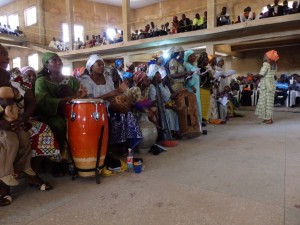from Peggy Faw Gish – Volunteer in Nigeria
Probably the most meaningful Holy Week observances I participated as I grew up in the Church of the Brethren, was what was called the “Love Feast,” which included feet-washing, a fellowship meal, and communion, all in one service. Before we participate, we are asked to examine our own lives, and if we are in a conflict with someone, go to that brother or sister and try to make things right between us. If followed, this is a way of freeing ourselves of anger, resentment, etc., but also freeing the community from tensions that can stifle the flow of love and God’s Spirit working among us.
Yesterday afternoon, it was a privilege to celebrate this ceremony here in Jos, Nigeria, with about four hundred Nigerian Brethren. I was the only American and person with white skin there.
When it came time for the feet-washing, small groups got up and went out to designated places, either for men or women, outside the building where chairs were set up and basins and towels were placed. A woman, dressed in colorful Nigerian dress, and who was in the choir, took my hand and led me out with one of the groups. There, along with other women, we took turns. First, this sister washed my feet and lower leg, one by one, and dried them. Then she sat down, and I did the same for her. Then we stood and greeted each other in love.
This was a simple act, which to some may seem crude or old-fashioned, but to the Nigerian Brethren and to congregations in the U.S., it is a powerful symbolic act. It is seeing that loving God is inseparable from loving and serving our sisters and brothers. It calls us to open ourselves in love, and to serve our brothers and sisters as well as be served—around the world and at home—the calling I and others have felt as we worked for peace and justice in our home community as well as abroad.
My heart was full, when my Nigerian sister washed my feet, and then we looked in each other’s eyes. Not only did it melt any anxiety I felt at the time of being the only American volunteer here with the Nigerian Crisis team, I felt it was preparing me for the next three months of living and working among the people. My thoughts also went further, to how desperately Nigerian society and other nations, entangled in wars of greed and power, need this kind of love and spirit, and how my own country needs this spirit in its relationships with countries around the world. How desperately the streets of U.S. cities and rural communities need the spirit of humility and seeing “the other” as our sister or brother, so that it can acknowledge the racist and oppressive attitudes and structures in ourselves and our society that kill and demean.
It’s a change of the heart and spirit, that if real, spreads to all other realms of our life and relationships, and that must flow into the city streets and beyond our borders, and can become a the source of healing, justice, and reconciliation, what we call the ”Kingdom of God.” And the time is always now to be a part of this.



